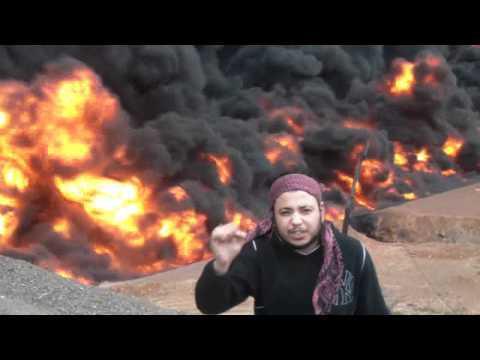Western journalists killed as Syria's Homs pounded
AFP
DAMASCUS- Two Western journalists were among dozens killed on Wednesday as Syrian forces pounded the rebel city of Homs, activists said, amid mounting calls for a truce to allow in humanitarian aid.
At least 24 civilians were killed in shelling of the Homs neighbourhood of Baba Amr in the 19th straight day of a government forces assault on the central city, the Syrian Observatory for Human Rights said.

France's President Nicolas Sarkozy said the killing of the journalists showed that "this regime must go," while Britain's foreign ministry summoned the Syrian ambassador to lodge a protest over the deaths.
From inside the quarter, activist Omar Shaker told AFP that the two journalists were killed and three others wounded as a shell crashed into a makeshift media centre set up by anti-regime militants.
French newspaper Le Figaro said one of its reporters, Edith Bouvier, was wounded in the legs, and Rupert Murdoch, who owns The Sunday Times, said the paper's photojournalist Paul Conroy was injured.
French television reporter Gilles Jacquier was killed in Homs last month when a shell exploded amid a group of journalists covering protests in the city on a visit organised by the authorities.
Syrian citizen journalist Rami al-Sayyed, who provided live footage on the Internet from Baba Amr, was also killed late on Tuesday when a rocket hit a car in which he was travelling, activist Hadi Abdullah told AFP.
Underscoring the growing security problems unfolding in Syria, Iraqi forces said they had arrested the head of a Sunni insurgent group believed to be linked to Al-Qaeda, as he tried to cross into Iraqi territory from Syria.
The latest attacks in Homs came a day after security forces killed at least 68 across Syria, adding to an overall toll of 7,636 -- most of them civilians -- since anti-regime protests erupted last March, according to the Observatory.
Outside Homs, the Britain-based watchdog said two civilians were killed by Syrian troops on Wednesday in the city of Khan Shaykhun, in the northwestern province of Idlib.
It said seven others, including a five-year-old child and a woman, were killed by security forces in Idlib's Jebel al-Zawiya area.
A call by the International Committee for the Red Cross for a two-hour truce daily to deliver aid to afflicted areas has meanwhile gained support from the United Nations, as well as from the United States and Russia.
Tuesday's call came a day after the ICRC said it was in talks with Syrian authorities and rebels to halt the violence.
The talks are still at "the initial stage," Saleh Dabbakeh, the ICRC spokesman in Damascus, told AFP. "We are exploring what can be done to implement a ceasefire."
In Geneva, the Syrian National Council began talks with ICRC officials on getting vital aid to crisis-hit areas.
The SNC, Syria's main opposition group, demanded the international community create "safe havens" and called on Russia to force the regime to allow access for aid convoys.
UN aid chief Valerie Amos backed calls for Syria to allow relief groups unimpeded access to the country.
A UN spokesman said that Amos would seek Syrian permission to visit the country to assess the ongoing crisis.
In Paris, the SNC said it would attend a summit of the countries known as the "Friends of Syria" and ask for safe zones to protect civilians.
The rebel Free Syrian Army head, Colonel Riyadh al-Asaad, has welcomed the humanitarian truce call but voiced doubts that the "criminal" regime would abide by a ceasefire.
White House press secretary Jay Carney said "we support calls for ceasefires to allow for the provision of humanitarian supplies to Syrians who desperately need it."
Moscow, a staunch ally of Syria, also supported the truce call, but Deputy Foreign Minister Gennady Gatilov said Russia was not backing a French proposal for aid corridors because these would require support from foreign troops.
Saudi King Abdullah told Russian President Dmitry Medvedev it was "futile" to have dialogue about Syria, saying Moscow should have "coordinated with the Arabs... before using the veto" to block a UN Security Council resolution on Syria.
The conversation came two days ahead of an international conference in Tunisia to be attended by the Syrian opposition and not the regime, to find ways to end the bloodshed.
Medvedev also spoke on the phone with his Iranian counterpart, Mahmoud Ahmadinejad, during which the two Syria allies rejected foreign intervention.
Russia announced it would not attend the "Friends of Syria" meeting because it was being convened "for the purpose of supporting one side against another in an internal conflict."
US Secretary of State Hillary Clinton, who will participate, said the Assad regime is increasingly isolated.
But a prominent Syrian opposition figure warned that Friday's conference would do little to resolve the crisis, and that the lack of progress on Syria was allowing the country to collapse into civil war.
"We haven't seen anybody putting forward a feasible solution to the crisis," Louai Hussein told reporters in London.
"The violence is escalating very quickly, especially in areas like Homs. On the political track, it's stuck, there is no progress at all," the former political prisoner said.
---------------------------------------------------------------------------------------------